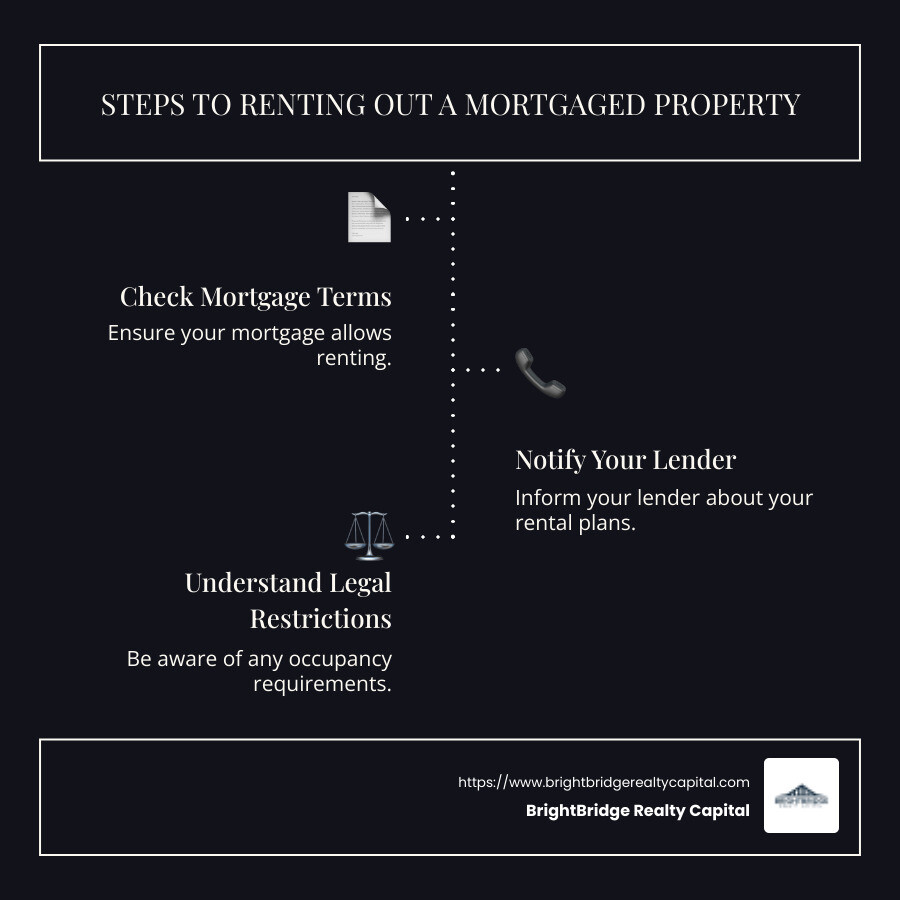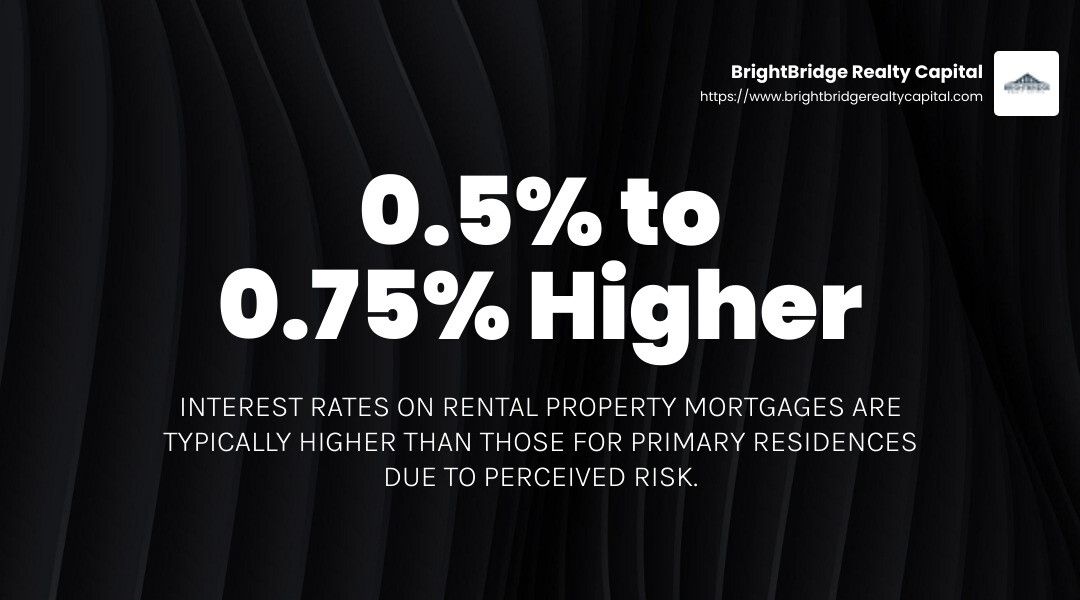From Homeowner to Landlord: Navigating Mortgages for Rental Properties

Buying a house to rent out mortgage is a strategy that attracts many aspiring landlords, offering a reliable path to passive income. Here's what you need to know quickly:
- Mortgage Agreements: Check your mortgage terms to ensure renting is allowed.
- Notify the Lender: Communicate with your lender regarding your rental plans.
- Legal Restrictions: Understand any occupancy requirements tied to your loan.
Turning your home into a rental property can be an exciting journey, but navigating mortgage agreements is vital. Mortgages can include specific conditions that affect your ability to rent and it’s essential to stay compliant to avoid fees or penalties. Whether you’re looking to bolster your income or diversify your investments, understanding these foundational elements is key.
Investing in rental properties not only generates additional income but can also increase in value over time. By renting out your house, you create a stable revenue stream while potentially enjoying tax benefits like deductions on mortgage interest and maintenance costs.

Know your buying a house to rent out mortgage terms:
Understanding Mortgages for Rental Properties
Becoming a landlord involves more than just buying a property. You need to steer mortgages for rental properties. Let's break down the essentials.
Types of Mortgage Loans
When it comes to financing a rental property, choosing the right type of mortgage is crucial. Here are the main types:
Conventional Loans: These are the most common and are not backed by the government. They usually require higher credit scores and larger down payments.
FHA Loans: Backed by the Federal Housing Administration, these loans are an option if you meet certain criteria. They often require a lower down payment but come with strict occupancy rules.
VA Loans: If you're a veteran, you might qualify for a VA loan with no down payment. However, these loans are primarily for primary residences, so be sure to check the fine print.
USDA Loans: These are designed for rural property purchases and also have strict occupancy requirements.
Choosing the right loan depends on your situation. Consider your credit score, down payment capability, and whether you plan to live in the property initially.
Mortgage Rates and Terms
Interest rates on rental property mortgages are typically higher than those for primary residences. This is because lenders view them as riskier investments. Expect rates to be 0.5% to 0.75% higher.

Loan restrictions are another critical factor. Some loans require you to live in the property for a set period before renting it out. This is to prevent occupancy fraud, where buyers claim they will live in the home but rent it out immediately instead.
To avoid issues, always review your mortgage agreement closely. Discuss your plans with your lender to ensure compliance with all terms.
Leasing Practices and Tenant Relationships
Once your mortgage is sorted, focus on leasing practices and building strong tenant relationships. Knowing local landlord-tenant laws is vital. These laws govern everything from security deposits to eviction procedures.
A good relationship with tenants can lead to longer leases and fewer vacancies. This not only stabilizes your rental income but also reduces the hassle of frequent tenant turnover.
By understanding the intricacies of mortgages for rental properties, you set a solid foundation for a successful investment. As you move forward, keeping informed and proactive is key to navigating this complex landscape.
Next, we'll explore the financial nuts and bolts of buying a house to rent out, including financing options and legal considerations.
Buying a House to Rent Out Mortgage
Navigating rental property investment can be challenging, especially when it comes to securing a mortgage. Let's explore the financial and legal aspects of buying a house to rent out.
Financing Options for Rental Properties
When you're buying a house to rent out, understanding your financing options is crucial. Here are some key factors to consider:
Down Payment: For investment properties, lenders typically require a larger down payment compared to primary residences. Expect to put down at least 15% to 25% of the property's purchase price.
Credit Score: A good credit score can significantly impact your mortgage terms. Generally, a score of 620 is the minimum, but a score of 740 or higher can secure better rates and terms.
Debt-to-Income Ratio (DTI): Lenders assess your DTI to ensure you can manage your existing debts alongside a new mortgage. They usually allow you to count up to 75% of expected rental income toward your DTI, making it easier to qualify.

These financial metrics determine your mortgage eligibility and the interest rates you'll receive. It's essential to have a clear financial picture before proceeding.
Legal Considerations
Beyond the numbers, legal considerations play a critical role in rental property investment:
Occupancy Requirements: Some loans, like FHA or USDA, may require you to live in the property for a specific period before renting it out. Always review these requirements to avoid any legal issues.
HOA Restrictions: If your property is part of a Homeowners Association (HOA), check for any restrictions on renting. HOAs may have rules about the number of units that can be rented or specific tenant guidelines.
Landlord-Tenant Laws: Understanding local landlord-tenant laws is essential. These laws cover everything from lease agreements to eviction procedures and tenant rights. Familiarity with these regulations helps ensure a smooth landlord experience.
By grasping these financing and legal aspects, you're better prepared to make informed decisions and avoid pitfalls. This knowledge not only helps secure a mortgage but also sets the stage for effective property management and rental income generation.
Next, we'll explore how to prepare your property for rent, including setting competitive rent prices and managing vacancies.
Preparing Your Property for Rent
Once you've secured a mortgage and steerd the legal landscape, it's time to prepare your property for tenants. This involves setting the right rent price, managing vacancies, and understanding the costs involved.
Setting a Competitive Rent Price
Setting the right rent price is key to attracting tenants and ensuring a steady income. Here’s how to do it:
Research Rental Comps: Look at similar properties in your area to see what they're charging. Use online real estate sites to compare features like size, number of bedrooms, and amenities.
Understand Local Demand: High demand areas might allow for higher rent prices. Check local listings and vacancy rates to gauge demand.
Consider Rent Collection Methods: Make it easy for tenants to pay rent. Using online platforms can streamline the process and ensure timely payments.
Managing Vacancies and Tenant Turnover
Vacancies can impact your rental income, so managing them effectively is crucial.
Prepare for Vacancy Periods: Budget for periods when your property might be empty. Setting aside funds for mortgage payments and maintenance during these times is wise.
Tenant Screening: Carefully screen potential tenants to ensure reliability. Check references, credit scores, and rental history to find trustworthy renters.
Lease Agreements: Use a lawyer-reviewed lease agreement that complies with local laws. This protects you and sets clear expectations for tenants.
Property Taxes, Maintenance Costs, and Insurance Policies
Understanding the ongoing costs of owning a rental property is essential.
Property Taxes: These can vary greatly by location, so check local rates and factor them into your budget.
Maintenance Costs: Regular maintenance is necessary to keep your property in good condition. Budget at least 1% of the property's value annually for maintenance and repairs.
Insurance Policies: Landlord insurance is more expensive than standard homeowners insurance but offers essential protection. It covers property damage and liability issues.
By preparing your property with these factors in mind, you can attract quality tenants and maintain a profitable rental. Next, we’ll address common questions about renting out a mortgaged home.
Frequently Asked Questions about Renting Out a Mortgaged Home
Can I Rent Out My House Without Telling My Mortgage Lender?
No, you must notify your mortgage lender if you plan to rent out your home. Failing to do so can violate your mortgage agreement, which might lead to serious consequences like fines or even foreclosure. Most mortgage agreements have clauses that require you to inform the lender about any change in the property's occupancy status.
How Soon Can I Rent Out My House After Purchase?
The timeline for renting out your house depends on your loan terms and occupancy requirements. For instance, if you have a USDA or FHA loan, you typically need to live in the property for at least one year before renting it out. Always check your specific loan agreement for any restrictions or waiting periods. Ignoring these rules can lead to issues like occupancy fraud, which is taken seriously by lenders and authorities.
What Are the Tax Implications of Renting Out a Property?
Renting out a property comes with tax responsibilities. You'll need to report rental income on your tax return, which is taxed as ordinary income. Additionally, if you decide to sell the property later, you might face capital gains tax. To avoid this, you generally need to have lived in the property for at least two out of the last five years before selling. Understanding these tax implications can help you plan and budget effectively.
Conclusion
Navigating real estate financing can feel overwhelming, but that's where we come in. At BrightBridge Realty Capital, we specialize in providing seamless, customized financing solutions for real estate investors. Whether you're buying a house to rent out or expanding your rental portfolio, our goal is to make the process as smooth as possible.
We understand that each investor's needs are unique. That's why we offer flexible funding options that cater to your specific investment strategy. Our team is dedicated to ensuring quick closings—often within a week—so you can seize opportunities without delay.
Choosing the right financing is crucial for maximizing your investment returns. We help you steer the complexities of mortgage loans, from understanding down payments and credit scores to managing debt-to-income ratios. With our expertise, you can focus on what's important: growing your rental property business.
Ready to take the next step in your real estate journey? Explore our financing solutions and find how we can help you achieve your investment goals.


